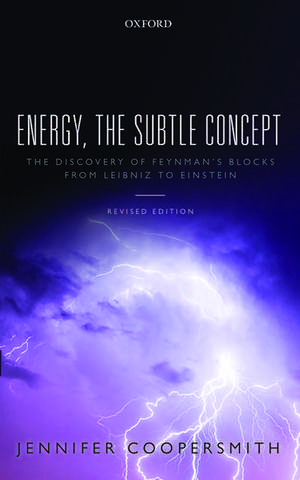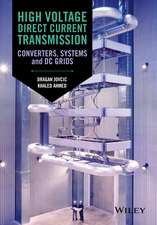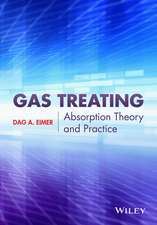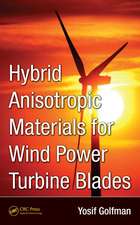Energy, the Subtle Concept: The discovery of Feynman's blocks from Leibniz to Einstein
Autor Jennifer Coopersmithen Limba Engleză Paperback – 14 mai 2015
| Toate formatele și edițiile | Preț | Express |
|---|---|---|
| Paperback (1) | 195.38 lei 10-16 zile | +49.76 lei 4-10 zile |
| Oxford University Press – 14 mai 2015 | 195.38 lei 10-16 zile | +49.76 lei 4-10 zile |
| Hardback (1) | 380.70 lei 31-37 zile | |
| OUP OXFORD – 15 iul 2010 | 380.70 lei 31-37 zile |
Preț: 195.38 lei
Preț vechi: 224.22 lei
-13% Nou
Puncte Express: 293
Preț estimativ în valută:
37.39€ • 40.60$ • 31.41£
37.39€ • 40.60$ • 31.41£
Carte disponibilă
Livrare economică 21-27 martie
Livrare express 15-21 martie pentru 59.75 lei
Preluare comenzi: 021 569.72.76
Specificații
ISBN-13: 9780198716747
ISBN-10: 0198716745
Pagini: 448
Ilustrații: 45 b/w line and halftone illustrations
Dimensiuni: 136 x 212 x 24 mm
Greutate: 0.54 kg
Ediția:Revised
Editura: Oxford University Press
Colecția OUP Oxford
Locul publicării:Oxford, United Kingdom
ISBN-10: 0198716745
Pagini: 448
Ilustrații: 45 b/w line and halftone illustrations
Dimensiuni: 136 x 212 x 24 mm
Greutate: 0.54 kg
Ediția:Revised
Editura: Oxford University Press
Colecția OUP Oxford
Locul publicării:Oxford, United Kingdom
Recenzii
The work is full of surprises, and some illuminating apercus. It makes one think about the subject in a new way - the connections made with dynamics, Hamilton and Lagrange are germane, and one never sees these in books on thermodynamics.
I am pleased to heartily recommend Coopersmith's readable, enjoyable, and largely nonmathematical yet profound account of the development of an important physical concept - energy. With a vein of humor running throughout, it deals with an enormous compass of important topics seldom found elsewhere at this level. It should be of great interest and utility to students, both undergraduate and graduate, historians of science, and anyone interested in the concepts of energy and their evolution through time.
In clear and engaging prose, Coopersmith shows how the modern understanding of energy was formulated, moving from the first documented discussions of simple machines and perpetual motion in ancient Greece, to the work of Gottfried Leibniz and other 17th-century thinkers, to Einstein's theory of relativity and beyond... 'Energy, the Subtle Concept' is a fascinating read, both physicists and nonphysicists who want to learn more about the history of energy will enjoy it.
Coopersmith has been on a commendable personal journey to understand energy
The more I read this book, the more difficult it was to put it down ... [It] has a fascinating story to tell about the development of our understanding of energy as a physical quantity...
beautifully-written text ... Throughout, the book is sprinkled with anecdotes and, most importantly, insightful commentary, with a plethora of figures that assist the reader in digesting the concepts detailed.
The conservation of energy is arguably the most important law in physics. But what exactly is being conserved? Are some forms of energy more fundamental than others? You will have to read the book to find out. Coopersmith sets out to answer such questions and to explain the concept of energy through the history of its discovery. This is neither a straightforward narrative nor one for the faint-hearted. Those not put off by the odd bit of mathematics, will be well-rewarded by dipping into this book.
This is a work of physics in substance and history in form. 'Energy, the Subtle Concept' is as much concerned with physicists as with physics. Its scientific interest is matched by human interest. Jennifer Coopersmith deftly brings to life the people who made the science throughout its history.
This book makes me proud to be a physicist, for two reasons. First it is a tale of the giants of the past who contributed to our present understanding of energy, people whose astonishing intuition took them from gossamer clues to the understanding we have today of one of the most basic explanatory concepts in physics. We've had some pretty good players in our team. More than this - and this is the second reason - this is a story as much about invention as discovery ... I am sure all physicists would enjoy this book and indeed learn from it.
I am pleased to heartily recommend Coopersmith's readable, enjoyable, and largely nonmathematical yet profound account of the development of an important physical concept - energy. With a vein of humor running throughout, it deals with an enormous compass of important topics seldom found elsewhere at this level. It should be of great interest and utility to students, both undergraduate and graduate, historians of science, and anyone interested in the concepts of energy and their evolution through time.
In clear and engaging prose, Coopersmith shows how the modern understanding of energy was formulated, moving from the first documented discussions of simple machines and perpetual motion in ancient Greece, to the work of Gottfried Leibniz and other 17th-century thinkers, to Einstein's theory of relativity and beyond... 'Energy, the Subtle Concept' is a fascinating read, both physicists and nonphysicists who want to learn more about the history of energy will enjoy it.
Coopersmith has been on a commendable personal journey to understand energy
The more I read this book, the more difficult it was to put it down ... [It] has a fascinating story to tell about the development of our understanding of energy as a physical quantity...
beautifully-written text ... Throughout, the book is sprinkled with anecdotes and, most importantly, insightful commentary, with a plethora of figures that assist the reader in digesting the concepts detailed.
The conservation of energy is arguably the most important law in physics. But what exactly is being conserved? Are some forms of energy more fundamental than others? You will have to read the book to find out. Coopersmith sets out to answer such questions and to explain the concept of energy through the history of its discovery. This is neither a straightforward narrative nor one for the faint-hearted. Those not put off by the odd bit of mathematics, will be well-rewarded by dipping into this book.
This is a work of physics in substance and history in form. 'Energy, the Subtle Concept' is as much concerned with physicists as with physics. Its scientific interest is matched by human interest. Jennifer Coopersmith deftly brings to life the people who made the science throughout its history.
This book makes me proud to be a physicist, for two reasons. First it is a tale of the giants of the past who contributed to our present understanding of energy, people whose astonishing intuition took them from gossamer clues to the understanding we have today of one of the most basic explanatory concepts in physics. We've had some pretty good players in our team. More than this - and this is the second reason - this is a story as much about invention as discovery ... I am sure all physicists would enjoy this book and indeed learn from it.
Notă biografică
Jennifer Coopersmith took her PhD in nuclear physics from the University of London, and was later a research fellow at TRIUMF, University of British Columbia. She was for many years an associate lecturer for the Open University (London and Oxford). She currently does similar work on astrophysics courses for Swinburne University of Technology in Melbourne while based at La Trobe University in Bendigo, Victoria.




















